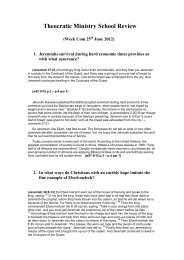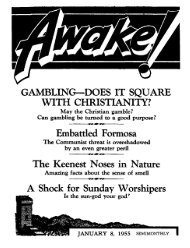1964 Awake! - Theocratic Collector.com
1964 Awake! - Theocratic Collector.com
1964 Awake! - Theocratic Collector.com
You also want an ePaper? Increase the reach of your titles
YUMPU automatically turns print PDFs into web optimized ePapers that Google loves.
information; and one encyclopedia is not<br />
likely to be enough. Consult several, for<br />
some will have excellent facts that are not<br />
in others. And by consulting several, you<br />
will be better able to check your facts for<br />
accuracy and reliability.<br />
Then there is the system of arrangement.<br />
Some encyclopedias are arranged<br />
alphabetically by large subjects; others<br />
by minutely alphabetized small subjects.<br />
When encyclopedias treat subjects as subtopics<br />
Wlder a main heading, it is vital to<br />
consult the index, and it is often a good<br />
idea to use the index with any encyclopedia.<br />
When using encyclopedias, it pays to<br />
know the date when a particular edition<br />
was issued. This will save you time. You<br />
may be looking for information about an<br />
event that took place after the publishing<br />
of the encyclopedia. For instance, if you<br />
were looking up information on a recent<br />
archaeological discovery and the encyclopedias<br />
in your library were several years<br />
old, you would need to go to one of the<br />
encyclopedia supplemental books, such as<br />
the Americana Annual, the Britannica<br />
Book 0/ the Year or Collier's Encyclopedia<br />
Year Book. These books are issued<br />
every year and contain information on<br />
events that took place the year previous<br />
to publication. Use of these volumes will<br />
help you to keep your facts up to date.<br />
If you happen to be doing religious research,<br />
it is vital to know that the latest<br />
editions of encyclopedias tend to whitewash<br />
or leave out the failures of Christendom's<br />
major religious organizations,<br />
thus obscuring the truth." So with such<br />
historical subjects, it pays to consult older<br />
editions of encyclopedias, such as the Britannica's<br />
excellent eleventh edition. Thus<br />
older editions never go wholly out of date,<br />
and they often include articles on subjects<br />
• For examples see the <strong>Awake</strong>!, November 22. 1962.<br />
pp. 11. 12.<br />
JULY 22, <strong>1964</strong><br />
no longer treated in current reference<br />
books.<br />
Further, if you are seeking information<br />
on a particular religion, it pays to get the<br />
official viewpoint of the religion involved.<br />
If one wants to know the Catholic viewpoint<br />
of certain religious doctrines, he<br />
could consult The Catholic Encyclopedia;<br />
or if he is interested in information on<br />
Jewish history and customs, he would do<br />
well to consult The Jewish Encyclopedia.<br />
Then in large libraries there will likely be<br />
the Encyclopedia Of Religion and Ethics,<br />
with its twelve volumes and an index; it<br />
has many articles on religious beliefs, cus·<br />
toms, and so on.<br />
Besides encyclopedias, there are books<br />
often known as "almanacs," such as The<br />
World Al-I-nanac and Book 0/ Facts, which<br />
are crammed with facts and figures on just<br />
about everything.<br />
Newspapers, Magazines. Books<br />
Often the facts you seek are not in almanacs<br />
and encyclopedias but may be in<br />
newspapers or magazines; this is especially<br />
true with the latest statistics, such as<br />
those on the rising rate of crime in a cer·<br />
tain area. Newspaper and magazine articles,<br />
however, tend to drop out of sight<br />
more easily than books; yet their information<br />
continues to be available through the<br />
agency of newspaper indexes and periodical<br />
indexes. Many libraries have newspapers<br />
on microfilm and they may have indexes<br />
such as The New York Times Index<br />
and The Official Index to the Times (London).<br />
Your library may also have a periodical<br />
index, such as the most-used one in<br />
the United States, the Readers' Guide to<br />
Periodical Literature, and Britain's Library<br />
Association's Subject Index to Periodicals.<br />
Canada, Australia, South Africa,<br />
Sweden, West Germany, Spain and other<br />
countries have indexes to their more important<br />
periodicals. The index will direct<br />
17




